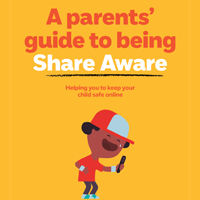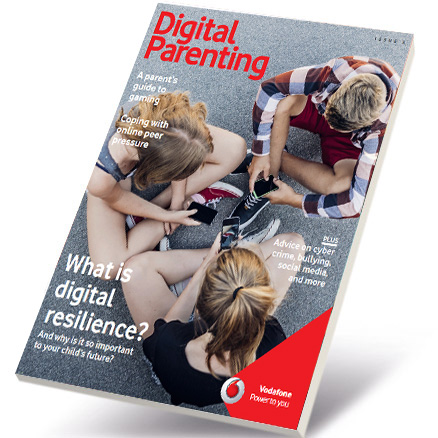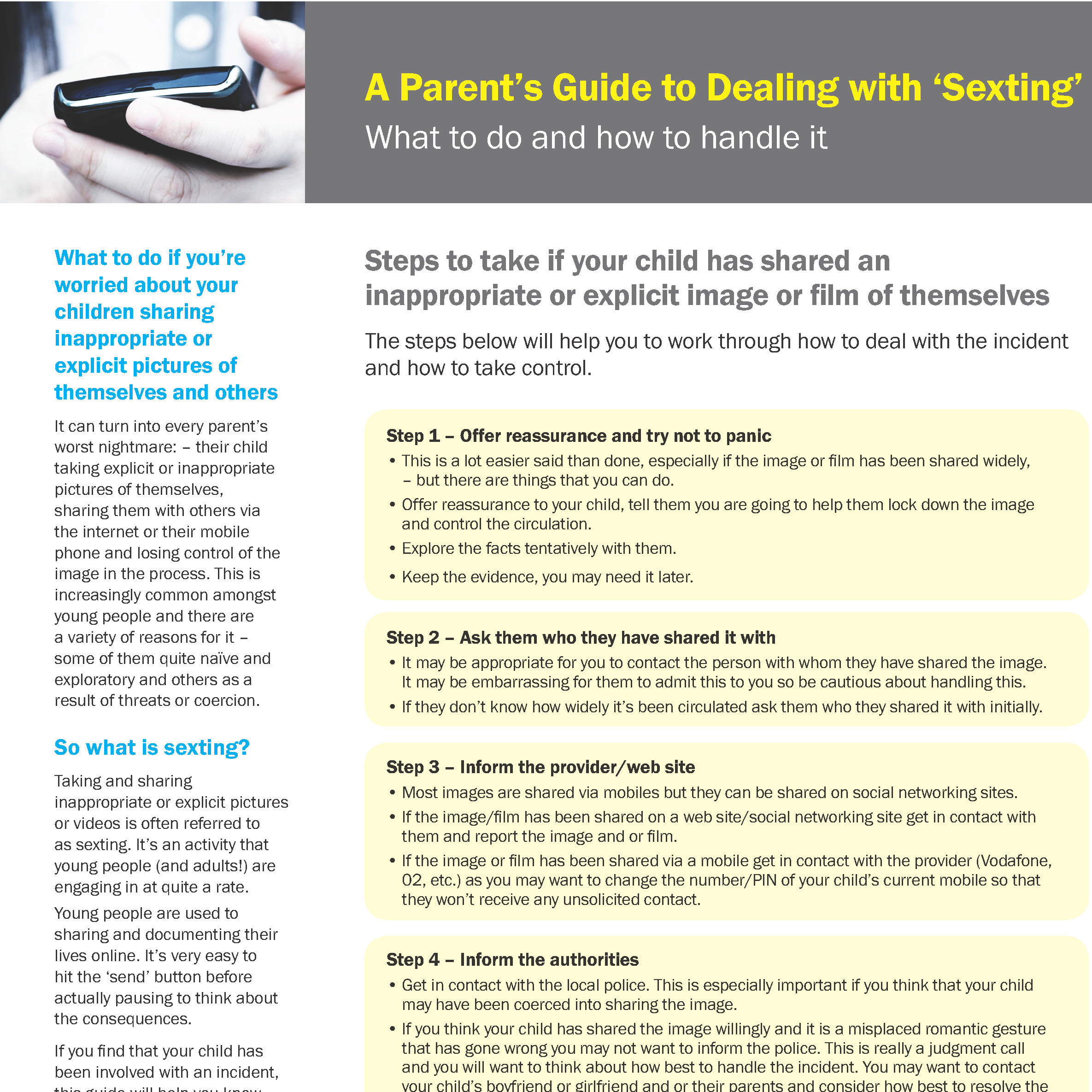Online Safety
Keeping Children Safe Online
E-safety is a priority of the safeguarding teams within the Trust, and with that in mind we have put together this e-safety section for parents and carers, containing information and links to resources produced by different organisations on a range of topics, from guides to different popular apps to information on keeping your details safe and private. When discussing safeguarding and children’s Internet usage, the feedback we receive is that many parents are unaware of what their children are accessing online, what the latest apps are, and what tools they can use to help their children use the Internet safely.
E-safety, which covers online and Internet safety, is a crucial part of modern education. Schools have a remit not only to ensure good e-safety practice in school but also to deliver the education required to allow pupils and students to make critical judgements and keep themselves safe when using the Internet and communications technology when away from the school environment.
 In school, as part of our commitment to protecting our students, we use Senso.cloud products to help us provide a rich, yet safe, digital learning environment for our students in line with Ofsted's recommended approach. The software's intelligent monitoring features provide an additional layer of protection on top of a standard firewall and allow us to provide much more protection than traditional basic filtering, while allowing young people to learn how to navigate the online world safely and assess risk for themselves. Keyword detection and real-time monitoring by the software, our teachers and our specialised IT staff help us identify vulnerable students, viewing anything that has been flagged within the wider context of a student's behaviour, and high-level filtering and content blocking help to ensure material deemed inappropriate is not accessible.
In school, as part of our commitment to protecting our students, we use Senso.cloud products to help us provide a rich, yet safe, digital learning environment for our students in line with Ofsted's recommended approach. The software's intelligent monitoring features provide an additional layer of protection on top of a standard firewall and allow us to provide much more protection than traditional basic filtering, while allowing young people to learn how to navigate the online world safely and assess risk for themselves. Keyword detection and real-time monitoring by the software, our teachers and our specialised IT staff help us identify vulnerable students, viewing anything that has been flagged within the wider context of a student's behaviour, and high-level filtering and content blocking help to ensure material deemed inappropriate is not accessible.
Think U Know.... How to guides
The Think U Know website, produced by the National Crime Agency, is a fantastic resource for all aspects of child safeguarding from online safety to young people and relationships.
As part of this, their range of support tools and films covering topics such as sexting and app usage contains 'How to..' guides for popular apps and websites, explaining such things as privacy settings, additional costs, age restrictions, and the level of control users have over their content.
The dangers children face online are real and constant, and a small selection of articles can be find via the links below:
Gaming: what parents and carers need to know
Many children will be spending time gaming online over the summer holidays. This article explores the different elements of gaming with a particular focus on how it can be used by offenders, but focusing on what parents can do to support their child while gaming.
Sharing pictures of your child online
Lots of parents love sharing photos of their children with friends and family, particularly when they are on holiday or starting the new school year. A recent Ofcom report found that 42% of young people reported that their parents had done this without asking their permission. Our article helps parents to protect their child while staying social.
Keeping under 5s safe online
Whether it's watching videos, playing games on their devices or talking to Alexa - today's under 5s are spending more time online. In this article we look at the benefits of children accessing the internet, and share advice about how parents can make sure their child has a safe experience online.
Live streaming: responding to the risks
Many children enjoy live streaming as it can be used to showcase talent, develop communication skills and create identity. Our article helps parents to understand why children love it, what the risks can be, and how they can help their child stay safe if they are live streaming.
Using parental controls
Parental controls are a great tool for helping to protect children but should not totally replace open and honest conversations with children about their life online. Share these tips on how to use parental controls effectively
NSPCC Keeping Children Safe
 nspcc.org.uk/preventing-abuse/keeping-children-safe
nspcc.org.uk/preventing-abuse/keeping-children-safe
In addition to NetAware, the NSPCC have a wealth of information on their main website on keeping children safe.
A large part of this relates to online safety, covering a vast array of topics from general safety, sharing too much information, and parental controls to specific articles on topics such as Pokemon Go, Minecraft, adult websites, and sexting.
Away from e-safety, the website also provides guidance on many other topics, including drug abuse, self harm, healthy behaviour, keeping children safe inside and outside of the home, and how to talk about difficult topics with children.
Parent Zone
![]() parentzone.org.uk/advice/parent-guides
parentzone.org.uk/advice/parent-guides
From internet safety magazines and online training, to parent guides on the latest digital trends and platforms, you can find advice and support here.
Parent Zone offer information and support in understanding the digital world, to help raise resilient children. Their services include Parent Info, Vodafone Digital Parenting magazine and the Parent Lounge, which gives access to our Parenting in the Digital Age training course.
Share Aware
 nspcc.org.uk/preventing-abuse/keeping-children-safe/share-aware
nspcc.org.uk/preventing-abuse/keeping-children-safe/share-aware
Share Aware, from NSPCC and O2, gives parents all the tools they need to have regular and informed conversations with their child about staying safe online. Under 20% of parents discuss online safety regularly with their children but we want to get every family talking about their child’s life online, just as they would their day at school.
Parents can sign up to the Icebreaker email series and become an expert in their child’s online world in 6 weeks, follow our four simple steps to keeping kids safe online, watch our film ‘Safety advice from a 10 year old’ or visit Net Aware – our guide to your child’s social networks apps and games.
The internet is a great place for kids to be, being Share Aware makes it safer.
Just like in real life, kids need our help to stay safe online. Teach your child to be #ShareAware with step-by-step advice from NSPCC and O2.
Digital Parenting Magazine
 vodafone.com/content/digital-parenting
vodafone.com/content/digital-parenting
Vodafone's 'Digital Parenting' website contains useful artices and advice about what children can see online.
The site also includes their popular and free Digital Parenting Magazine which can be viewed online (along with previous issues).
The magazine is aimed at parents and contains a great variety of articles, statistics and advice covering a range of different topics.
![]()
Alderman White School is a member of
The White Hills Park Trust.

Website design and content
© The White Hills Park Trust 2025


